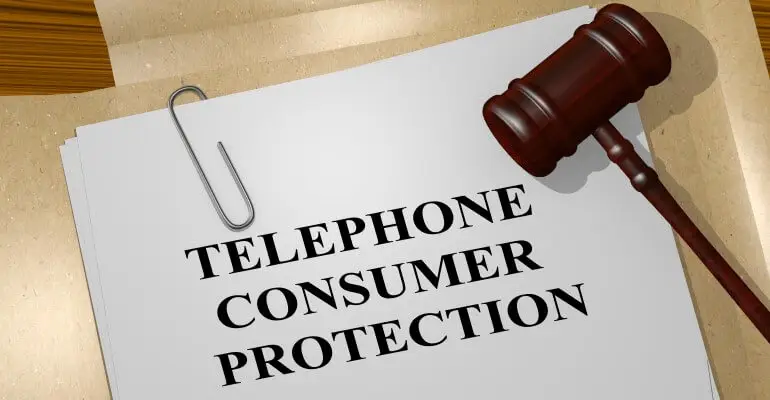Opt-Out Texts: Are they a TCPA Violation?

Did you know that the #1 complaint among consumers is abusive, harassing robocalls? The Telephone Consumer Protection Act (TCPA) protects consumers from such calls. In fact, you could be entitled to $1500 or more if you have experienced such violations. However, when it comes to cellphones and TCPA, consumers can become confused about what is legal and what is not.
One such question that arises is, “Are text messages legal or not?”
What does opt-out mean in a text message?
Have you ever been bombarded with texts from a retailer or bill collector? It is not an uncommon business practice to not only sell things but also to attempt to collect funds from you for a car loan, student loan, or other types of loans. When you let them know that you want to opt-out of text messages, that means that you wish no further communications from them sent to your phone via text.
Are opt-out texts a TCPA violation?
When the company replies to you with an opt-out text to confirm your desire to stop communications, this text is not considered a TCPA violation by the Federal Communications Commission (FCC) according to a ruling issued in 2012.
TCPA opt-out requirements mandate that the consumer must contact the company first to let them know you want to stop communications. Once that is complete, and the opt-out text is confirmed from the company, then they cannot contact you again via text.
What is a TCPA violation?
Obtaining a clear understanding of the TCPA and text messages is not the only area you should be aware of when it comes to your consumer rights. TCPA violations happen every day in Florida and across the country.
Approximately 1.5 billion robocalls happen every day. These can be overwhelming and stressful for you and your family. But it is essential to know that not all calls from banks, bill collectors, and other solicitors are illegal. There are distinct parameters for companies to contact you defined in the TCPA requirements.
These are the rules that companies must adhere to under the TCPA:
- Prohibiting solicitors from calling cellphones or U.S. households before 8 a.m. or after 9 p.m., local time
- Prohibiting solicitors from calling cellphones or U.S. households using an artificial voice or a recording
- Requiring solicitors to maintain a company-specific “Do-Not-Call” (DNC) list – and honor the National Do Not Call Registry
- Requiring solicitors to provide their own name, the name of the entity or person on whose behalf the call is being made, as well as a telephone number or address where that entity or person may be contacted
The time restrictions listed for calls also apply to texts. So, if you have not sent an opt-out text request and had it confirmed through the company, they can contact you between 8 a.m. and 9 p.m. local time. The general TCPA rules can also cover faxes as well.
What are the penalties for companies that violate the TCPA?
The TCPA intends to not only reduce the number of robocalls and texts sent to consumers but also severely penalize companies who are constant abusers of the legislation. Here are the penalties for TCPA violations:
- $500, at a minimum, for each call
- Up to $1500, per call, if they keep contacting you after you have explicitly told them to stop
These penalties are substantial and can add up to significant remuneration for a consumer who has frequently had their rights violated by harassing debt collectors or other solicitors.
Note: even if you owe money to a particular company, they are still required to follow the TCPA regulations. If your consumer rights have been violated, you should contact a TCPA attorney to determine your best legal options.
What consumers can do to strengthen their claim for TCPA violations
As a consumer, you have the ability to help prove your claim of violations of the TCPA. Whether in regards to the TCPA and text messages or to address repeated illegal activity from robocalls in specific infringement of the TCPA, there are several actions you can take to strengthen your case. These include:
- Save a record of cellphone calls and texts, highlighting ones from telemarketers, banks and other debt collectors
- Research previous voice messages from telemarketers, banks, and other debt collectors, save them and make sure to keep any ongoing voice mails from them that continue to occur
- Record details of any calls that you received from telemarketers, banks, and other debt collectors including who you talked to, the subject of the conversation, and date and time
- Save a screenshot of any opt-out text confirmations from telemarketers, banks, and other debt collectors, as well as any physical letters you may have received for Do Not Call lists or registries
The more documentation that you have, the better. Even if you feel you may not have enough documentation, it is important to consult with a legal professional. They can advise you on the best way to move forward with a TCPA violations claim.
More Questions About TCPA Violations?
Are you dealing with harassing robocalls and want more information to determine if you have a case? Here are some additional resources to assist.
- Top 3 Reasons Why You Should Hire a TCPA Attorney
- Stopping Bad Robocalls Act: House Passes New TCPA Bill
- TCPA Violations: Do You Have a Case?
- TCPA and Robocalls: Is Your Cellphone Protected
- Does the TCPA Apply to Debt Collectors
- Top 5 Telemarketing Tactics Used to Target Customers
- Consumer Protection: New Proposed Traced Act Designed to Stop Robocalls
Please Note: At the time this article was written, the information contained within it was current based on the prevailing law at the time. Laws and precedents are subject to change, so this information may not be up to date. Always speak with a law firm regarding any legal situation to get the most current information available.
Related Posts
Recent Posts
- False Claims Act Retaliation & Your Rights
- Fired for Being Pregnant? 5 Situations When You Should Call an Employment Lawyer
- Can My Boss Take My Tips? The Laws of Tip Ownership
- What Does “Meets FCRA Requirements” Mean?
- Can Your Employer Contact You While on Medical Leave? Know Your FMLA Rights in Florida
Contact Us

FREE HELP GUIDES
Dealing with unpaid wages, discrimination or wrongful termination? Get the information you need to protect your workplace rights. We offer employment law resources to help you fight for workplace justice.



